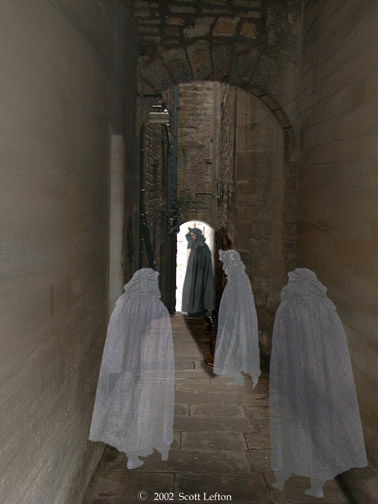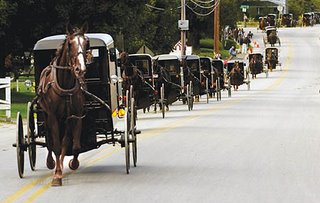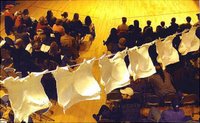
I will offer this sermon today at a little rural church about a half hour from my home. It was fun working with Job after my musings of about a month ago. Regular readers will recognize some content...
“God’s Promise”
Job 1:1-22; 2:7-10
October 8, 2006
On an episode of “The Simpsons” that aired a number of years ago, a massive hurricane hits the normally sunny town of Springfield, destroying the house of Ned Flanders, Homer and Marge’s godly neighbor. At some point in the episode, the scene flashes to the sign out in front of the First Church of Springfield: it reads, “GOD WELCOMES HIS VICTIMS.” Let’s admit it: this week’s reading from the book of Job does cause one to wonder. Let’s review the facts. There is this wonderful man, Job. In the words of our passage, he is blameless and upright, he fears God and turns away from evil. He is prosperous and has a large family of children whom he seems to have raised right, because they like each other! They all like to get together to have big family dinners all the time! And their father, rather than lecture them on morality (which we suspect isn’t really necessary, seeing all this family love on display), quietly offers atonement sacrifices for them, just in case they’ve strayed in their hearts. Job is not only righteous: he’s also humble. He sounds downright sweet! And so, naturally, God allows Satan to destroy all his property, kill all his children, and afflict him with loathsome, painful boils, in an effort to find out if he’s really all that righteous. “God welcomes his victims.”
It is a question as old, perhaps, as language itself. Why do terrible things happen to innocent people? In a week in which the Lancaster, PA Amish community buried five little girls and hovers anxiously at the bedsides of five other little girls, we might well ask this question. Just a year after hurricane Katrina, and just three months after devastating flooding in upstate New York, we might well ask this question. Approaching two years after the Southeast Asian tsunami took an estimated 200,000 lives, we might well ask this question. Why? Why do terrible things happen to innocent people?
If we read scripture, we have a mixed bag of answers to this question. We have many psalms and great portions of the Hebrew Scriptures that say, with a loud voice: “Bad things only happen to bad people. You were beaten by the (insert biblical enemies here)? You must have offered sacrifices to idols. You lost this or that city? You must have disobeyed God’s command to leave no enemies left alive, even to their women and children. You were carried off into the Babylonian exile? You must have been intermarrying with non-Hebrews. You must have done something wrong.” This is a strong and persistent theme throughout great portions of scripture.
And that is a view that has not, really, gone out of date. You may remember that after 9/11, the Rev. Jerry Falwell quickly assigned blame for the attack. He said that it was God’s punishment for the US not being a Christian nation, and he cited gays, lesbians, and feminists as proof of this. There followed such an outcry of protest that the original statement was backpedaled, with Falwell saying that only the terrorists and hijackers bore the blame.
Lest I be too hard on Rev. Falwell, this kind of thinking is widespread and pervasive. In fact, I daresay we each carry a little of it within ourselves. One of my best friends from seminary, as she cried on the phone to me over the breakup of a relationship she was sure would lead to marriage and children, said “I can’t help asking, what did I do to deserve this?” I know just what she means. There have been times when I too felt that I must have done something terrible to deserve all this pain.
But it’s important for us to note that there are other themes in scripture as well, though. There are strong currents that disagree with the notion that God punishes us in the here and now for our transgressions. As Christians, there is one that ought to jump to mind rather quickly. The reason terrible things happen to good people is that God has a purpose that can only be accomplished in that particular way. Consider Jesus. The description of Job applies to him, certainly—if not more so. He too is blameless and upright, he too fears God and turns away from evil. Not only that, he spends his life and his ministry helping and gathering in celebration with the ‘least of these,’ the poorest, the downtrodden, the rejected and despised. Jesus’ righteousness is so striking that we have developed a whole new way of thinking about him: he is, in the words of our passage from Hebrews, “the reflection of God’s glory and the exact imprint of God’s very being” (Hebrews 1:3). And yet, a terrible thing happens to Jesus. He is arrested on trumped up charges, tried by a kangaroo court, and horribly tortured and executed. Why? Because, scripture tells us, that was the only way to accomplish salvation for all the rest of us sinners. Bad things happen to good—the best—people, because God has a purpose that can only be accomplished in that particular way.
Good-hearted people often offer this logic in hopes of giving consolation in the face of tragedy. God must have wanted to show us something, teach us something, God wanted another angel for the heavenly choir, God ended this relationship so that a new, better one could take its place. I don’t know about you, but when I’m bleeding on the inside, this line of reasoning is not terribly comforting. That doesn’t mean it’s not true. It’s just not terribly comforting.
There is another theme in scripture. This theme tells us that we simply don’t have God’s eve view of the situation, and so all our speculation about evil and suffering, while legitimate and important, is not necessarily going to provide us with answers. This idea is a strong undercurrent in our own Calvinist heritage, and has to do with the sovereignty of God. We profess that nothing happens that God does not either will or permit. And, I might point out, that there is a huge space between what God might will—in other words, something God wants to have happen, even causes to happen—and what God might allow to happen. For some people, free will plays a huge role in this thinking. We recognize that God has created the heavens and the earth and human beings and animals and plants and microorganisms, and has given all these things their own logic, laws and properties, and allows the whole shebang to function and unfold and roll along as it will. And where there is free will, and where there are sinful people, where there is brokenness at the heart of it all, tragedy will occur. But we can’t lay it directly at God’s doorstep, because a lot of it has to do with what we have made happen. God permits natural consequences of human action to take their course.
And so we come to Job. Here is a case of God’s permission being given for terrible things to happen in a way that feels an awful lot like God willing something to happen. Let’s just say that God does not come off too well in this story—certainly not in the passage we are reading. God enters into a bargain with Satan. It’s interesting to note that, at the time this book was written, Satan is understood as a member of the heavenly court, not evil incarnate or the devil, or someone who is actively trying to cause the downfall of human beings. Satan—which, in Hebrew means, literally, “The Tempter”—simply tests out theories of good and evil, and tests God’s view of the world and God’s people. God permits Satan to decimate Job’s life, and it causes us to wonder. It reminds me of an old story about Saint Teresa of Avila, the medieval mystic and church reformer. One day as she was traveling around on her donkey, the animal slipped and off Teresa fell into a muddy stream. Looking up to heaven she shook her fist and said, “God if this is how you treat your friends, no wonder there are so few of them!”
This must be how Job felt. Imagine, as one after another, the servants came to tell their terrible tales of tragedy, devastation, disasters natural and manmade. Imagine what must have been going on in the innermost heart of this righteous man as he heard the dreadful news. These animals are gone. These servants. These children.
Job’s response is startling, to say the least. After the last messenger has brought the most devastating news, Job rises up, tears his robe and shaves his head—both ancient and traditional symbols of mourning—and then he falls on the ground and worships God. When he can finally speak, Job says words at once chilling and hopeful, some of the most famous words in scripture: “Naked I came from my mother’s womb, and naked shall I return there; the Lord gave, and the Lord has taken away; blessed be the name of the Lord” (Job 2:21).
Part of me wants to say: this Job, he’s really too good to be true. A few years back I taught a class on prayer, and one of the folks who attended said something around class 5 that shocked me, and which I didn’t quite believe. He said that the only prayer he ever prays is “Thy will be done.” I think I said something wholly inappropriate at the time, something like, “You’re kidding me.” That’s the reaction I have to Job. “You’re kidding me.”
And yet. And yet. There is something about the biggest losses in our lives that just completely opens us to God’s presence. Heartbreak can pry us open in a way nothing else can. That is the deep emotional truth of this story. When the floor just falls out from beneath you, the earth gives way, the bridges collapse, and you are stunned to still find you are still here, there is really nothing left to do but to turn to God. In Job’s case, he turns to God with resignation, with praise, even with gratitude. He turns to God and says, in essence, “I accept this. Whatever it is, I accept it, because it is from your hand.” And whatever our understanding of suffering is, whether we understand God to have a purpose in our suffering, perceived or hidden, the ability to still turn to God in trust is the key to living with our suffering.
In the 1950’s the great folk singer and activist Woody Guthrie was lying in a hospital bed suffering from what would later be diagnosed as Huntington’s Chorea. While he struggled to understand the disabling tremors, mood swings and the loss of motor control that characterize the onset of the disease, Woody wrote the words for a song. This song wrestles with the problem of pain and suffering, and the fact that it seems so unfair. Instead of asking the question, “Why?” this song begins to propose a “How”—how to live with suffering, how to understand God’s relationship to us in suffering. The song is called “God’s promise.”
I didn't promise you skies painted blue
Not all colored flowers all your days through
I didn't promise you, sun with no rain
Joys without sorrows, peace without pain.
All that I promise is strength for this day,
Rest for my worker, and light on your way.
I give you truth when you need it, my help from above,
Undying friendship, my unfailing love.
In this song, the great theologian Woody Guthrie hits upon a truth that can be found all throughout scripture, in every interpretation of pain and suffering. God abides. God remains with us. God stays in relationship with us. God promises God’s presence and help from above, undying friendship, and unfailing love. This is what I believe is behind Job’s ability to fall down and worship God in the most horrible moment of his life: Job’s utter trust that God will abide and remain with him, no matter what. Job knows that, despite what might reasonably pass as evidence to the contrary, God has not abandoned him. Job instinctively knows that his suffering is no evidence of God’s lack of love for him. God’s promise, to remain with us, abides.
I never did promise you crowns without trials,
Food with no hard sweat, your tears without smiles,
Hot sunny days without cold wintry snows,
No vict'ry without fightin', no laughs without woes.
I sure didn't say I'd give you heaven on earth,
A life with no labor no struggles no deaths,
No earthquakes no dryspells, no fire flames no droughts,
No slaving no hungers, no blizzards no blights.
All that I promise is strength for this day,
Rest for my worker, my light on your way,
I give you truth when you need it, my help from above,
Undying friendship, my unfailing love.
Amen.


























